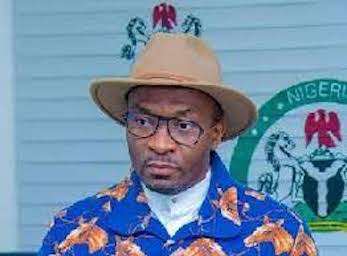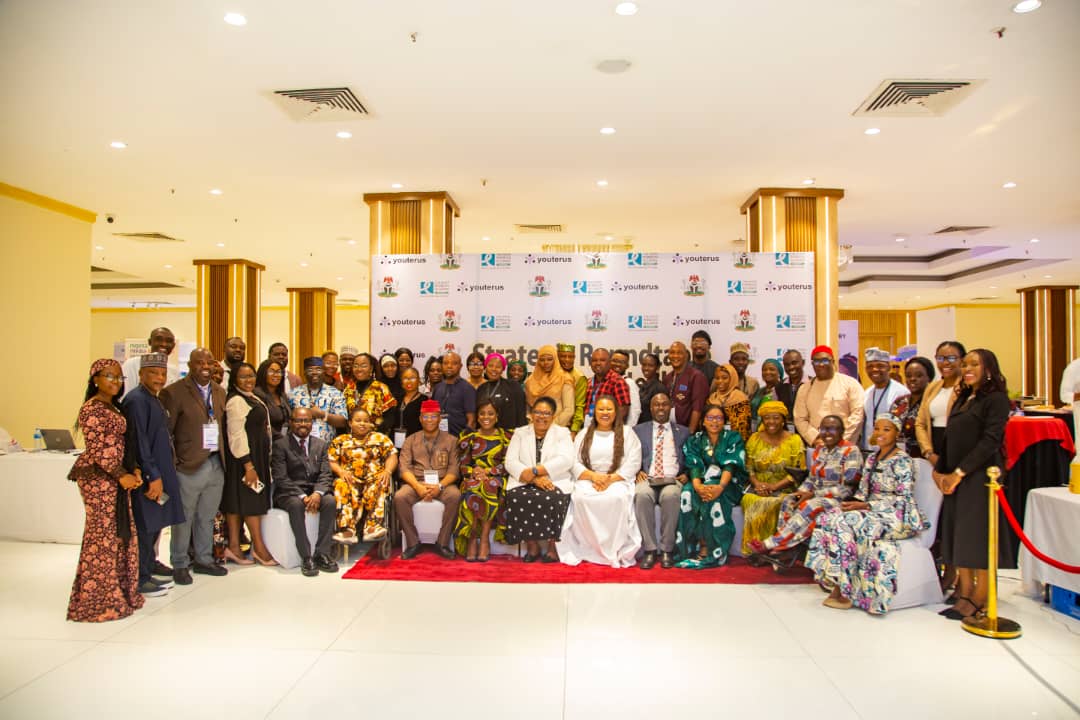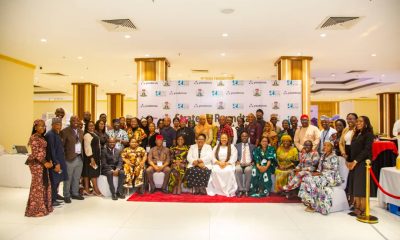NEWS
Kalu Says Nigeria/UK Trade Relations was £7.2 billion in 2024

By Ubong Ukpong, Abuja
House of Representatives Deputy Speaker, Benjamin Kalu, on Thursday, said that trade relations between Nigeria and the United Kingdom amounted to about £7.2 billion in 2024, with a trade surplus of £3.4 billion in favour of the UK.The Deputy Speaker also said that the National Assembly was seeking to create about 74 federal legislative seats and 108 state assembly seats for women in the ongoing constitutional review process.
Speaking when the Parliamentary Undersecretary of State (Africa) for Foreign and Commonwealth Development Affairs, Lord Collins of Highbury, visited him, Kalu said that with a population of about 230 million, Nigeria is Africa’s largest economy, adding that in 2024, the nation’s economy demonstrated a growth rate of 3. 4%, marking our highest in a decade.He said total trade in goods and services between the UK and Nigeria amounted to £7.2 billion in the four quarters in 2024 with total UK exports to Nigeria amounting to £5.3 billion (an increase of 3.2% compared to the previous year), while total UK imports from Nigeria stood at £1.9 billion.He said further that this indicates a trade surplus of £3.4 billion for the UK, with Nigeria being the UK’s 38th largest trading partner during this period, accounting for 0.4% of total UK trade.On legislative representation, Kalu said, “we observe with keen interest the progress made in the United Kingdom Parliament, where women now constitute approximately 40% of the House of Commons (263 female MPs) and 30% of the House of Lords, resulting in an overall representation of 35% and ranking the UK 27th globally according to the Inter-Parliamentary Union (IPU). “In Nigeria, female representation in the National Assembly currently stands at less than 5% (4.05%, with 19 women out of 469 seats: 4 in the Senate and 15 in the House of Representatives). This positions Nigeria at 178th out of 182 countries in the IPU’s global standings.”As Chairman of the House Committee on Constitution Amendment, and as the sponsor of the Special Seats Bill, which aims to create an additional 74 federal legislative seats and 108 state assembly seats for women, I am committed to ensuring our legislative framework is more inclusive.“In our ongoing constitutional reform efforts, particularly concerning inclusion and representation, the insights and experiences of the UK Parliament are highly valued.We propose the establishment of robust legislative exchange programmes to benchmark policies, facilitate collaboration on committee work, promote youth inclusion, and strengthen public accountability mechanisms.The Deputy Speaker said the bilateral partnership between Nigeria and the United Kingdom is multifaceted, as demonstrated by the Nigeria-UK Strategic Partnership agreed on November 4, 2024, and further reinforced by eight partnership agreements signed in September 2024 valued at approximately N589 billion (£272.6 million).These agreements, he said, span critical sectors including governance, climate change, education, health, and the economy, with Key areas including the Enhanced Trade and Investment Partnership (ETIP), signed in February 2024, which is strengthening ties in legal services, financial technology, and renewable energy.He said the UK-Nigeria Security and Defence Partnership (SDP) has achieved significant milestones, including the establishment of the Multi-Agency Anti-Kidnap Fusion Cell and securing over 500 terrorism-related convictions and the UK-Nigeria Memorandum of Understanding (MoU) on Cyber Security Cooperation, signed in February 2024, which provides a cooperation framework through 2027.In addition, he said Nigeria recorded a balance of payments surplus of $6.83 billion in 2024, while the Digital Special Economic Zones aim to position Nigeria as a leading technology hub in Africa.On Education, he said the expanded exchange programmes, increased scholarships, and the lifting of restrictions on £55 million of transnational education investment are facilitating collaborations between UK and Nigerian universities, while Initiatives such as Propcom+ are assisting over 4 million Nigerians in adopting sustainable agricultural practices and transitioning to renewable energy.Kalu also said the nation’s development cooperation, supported by over £1 billion from the UK across various programmes, focuses on governance, job creation, support for women and girls, humanitarian aid, climate resilience, and health. These sectors represent significant opportunities for deepening our collaborative efforts. The Deputy Speaker said the United Kingdom’s May 2025 Immigration White Paper, “Restoring Control over the Immigration System,” introduces several reforms, including raising the Skilled Worker visa threshold to RQF Level 6, increasing salary thresholds, replacing the broader Immigration Salary List with a more restrictive Temporary Shortage List, extending the qualifying period for settlement to ten years for most routes, tightening English language requirements (B2 for main applicants and introducing requirements for adult dependants), shortening the Graduate Route visa to 18 months, and closing the overseas Social Care Worker visa route to new applicants.He said these measures have the potential to create new challenges for Nigerian nationals who have historically contributed to the UK’s economy and society.He stressed that the relationship between our nations is built on a foundation of shared objectives and a forward-looking vision, saying “we anticipate that our parliamentary cooperation will continue to strengthen, contributing to the prosperity and well-being of both our countries”.Earlier, Lord Ray Collins, UK’s Minister for Africa at Foreign Commonwealth Development Office (FCDO) said that the United Kingdom (UK) was committed to fostering stronger international ties with Nigeria, to ensure democratic and economic development.Collins affirmed UK’s interest in Nigeria’s democratic and economic development saying, “I am here to cement strong partnership on economic growth, creating a win-win relationship and increasing the welfare of our people together”.The minister, who reiterated UK’s passion for Nigeria’s development, reassured of the country’s interest in supporting democracy in Nigeria.
NEWS
Stakeholders task FG on making Uterine Health a priority

By Laide Akinbpade, Abuja
Stakeholders in the Health sector on Thursday, tasked the Federal Government (FG), to make women uterine health a priority in Nigeria.
This appeal was made at a one-day strategic roundtable on Uterine Health in Nigeria, organized by Federal Ministry of Health and Social Welfare (FMoH&SW) with The White Ribbon Alliance Nigeria and Youterus, in Abuja.
Uterine health is the overall condition and functionality of the uterus encompassing, it’s structural integrity and ability to perform its various roles such as menstruation and carrying a pregnancy.
Uterine health conditions like fibroid, abnormal uterine bleeding, endometriosis, chronic pelvic pain, endometrisis and menopause impact on millions of Nigerian women but are often excluded from national health policies and services.
It has been discovered that fibroid alone accounts for 30% of gynecological consultations at Nigerian tertiary hospitals.
With Uterine health missing from from the key national framework, it is therefore imperative for government to give it a priority.
Dr. Binyerem Ukaire said, women are the bedrock of every nation and are crucial to social economic development of any nation. A woman reproductive health cannot be good without good uterine health.
Dr. Samuel Oyeniyi, Director Reproductive Health, Division FMoH &SW, in his paper presentation titled, ‘Uterine Health and its public health importance in Nigeria’, at the occasion said Uterine Fibroids are extremely common affecting approxemately 12.1% of Nigerian women about 12.8million women nationwide
“Among black women the lifetime risk rises to 80% by age 50. Fibroids are major cause of hospital visits and gynecological surgeries leading to symptoms such as chronic pain, heavy menstrual bleeding, anemia and infertility, most women affected are in their productive age.
“Endometrisis affects upto 48.1% symptomatic Nigerian women in some studies, causing severe pelvic pain, painful menstruations and infertility and diagnosis takes between 7 to 10 years.
“PCO affects 17 -28% of Nigerian women disrupting mentrual cycles and causing hormonal imbalance that can lead to diabetes, obesity and cardiovascular risk and can be undertreated or underdiagnosied.
“While Pelvic Inflammatpry Disease (PID), affects 116 per 100,000 women in West Africa, making it a leading cause of infertility and ecotopic pregnancy in Nigeria.
“Cervical cancer causes more than 8,000 deaths and more than 13,000 new cases yearly in Nigeria . it is prevented by HPV vaccines and about 12 million Nigerian girls have been reached “.
But he said Nigeria’s Non-communicable Disease (NCD), action plan provide an opportunity to include chronic uterine conditions.
He concluded in his presentation by saying, investing $1 in uterine health would yield $9 in benefits.
Dr. Nana Chidi Emmanuel Chairperson, Board of Trustees White Ribbon Alliance Nigeria, in her welcome speech at the roundtable said it is imperative that women health especially uterine health should be prioritized in Nigeria’s health system.
She said currently women are going through a lot psychologically, mentally and other wise, so women health must be a priority to any government all over the world.
She said, “Chronic uterine conditions such as fibroids, abnormal uterine bleeding, and endometrosis affect millions of Nigerian women and girls, causing immeasurable suffering, recurrent medical crises, and economic hardship. Despite this immense burden, women facing these conditions have long confronted silence, stigma, and systemic neglect. Too often, their pain is dismissed, their diagnosis delayed, and their pathways to care—financially and logistically—out of reach.
“Today, together with our committed partners at Youterus Health, we affirm our collective will to change this narrative. We aim to place uterine health at the center of national policies in Nigeria and Africa, financing, and service delivery—moving it from the margins of awareness into the mainstream of Nigeria’s health and development agenda.
“Let us remember that at the heart of these deliberations are the stories and hopes of real women and girls—mothers, daughters, sisters, friends—who endure the daily realities of untreated uterine conditions. Their experiences fuel our urgency and remind us all why this work matters deeply. Our collective efforts here today can catalyze meaningful change that restores health, dignity, and hope.
“WRA Nigeria firmly believes that the leadership of the government working hand in hand civil society and the private sector, is essential to drive durable, just, and people-centered changes. It will take our united voices, innovative models, and steady commitment to dismantle the barriers that have persisted for too long”.
Fatou Wurie, the Chief Executive Officer and Founder of Youterus Health,
in her welcome speech said, uterine health affects millions of Nigerian women and it is under developed women wellbeing and it impact, not only the physical health but social and economy of any nation.
And this uterine health challenges have caused immeasurable suffering in women in Nigeria.
She lamented that most often the pain women feel is ignored and diagnosis delayed.
She said it is imperative for Federal Government to place uterine as a national priority that should be taken up.
“Uterine Health has long being an issue in the world. Uterine Health should be a national issue that should be on a top burner. We are really looking forward to government priotising uterine health in Nigeria”, she said.
Austin Akpakwu, from the office of the Vice President, who represented the Senior Special Assistant to Vice President on Public health, said the office of the Vice President, is keen to support in addressing the uterine health challenges in Nigeria, “It is a laudable project and the office of Vice President is very keen in supporting this project. I have a junior sister that has uterine health issue and that is presently in the hospital so this is very important issue and all hands must be on desk to address it”.

NAFDAC Generates N2.5bn from Illicit Drug Market Raids
By Ubong Ukpong, Abuja
The National Agency for Food and Drug Administration and Control (NAFDAC) on Wednesday, said that it generated N2.5 billion from its recent raids of illicit drug markets in Lagos, Onitsha, and Aba, respectively.
Director-General of the agency, Prof.
Mojisola Adeyeye, who revealed this during a session with the House of Representatives Committee on Food and Drug Administration and Control, said the funds were fines collected from traders found guilty of selling fake or substandard drugs during recent enforcement actions in open markets across the country.While stressing that all funds were paid directly into NAFDAC’s official account, she noted that N996 million was spent on enforcement operations, N159 million was borrowed from a donor grant, and N1.175 billion went to regulatory expenses.
According to her, the agency was left with about N206 million after deductions.
She said the operation, which deployed over 1,300 security personnel, uncovered widespread violations ranging from expired and unapproved drugs to poor storage practices.
Adeyeye said the enforcement drive, which lasted up to four weeks in some locations, uncovered serious threats to public health.
She disclosed that some shop owners were caught distributing banned substances like Tramadol and selling expired or unregistered medicines.
“These charges were not punitive but necessary. The standard fine for violating Good Distribution and Storage Practice (GDSP) is N2 million, but in many cases, we reduced it to N500,000,” she said.
She, however lamented that the agency’s inability to sustain such critical operations is being crippled by severe revenue restrictions imposed by the federal government
While decrying the financial constraints facing the agency, Adeyeye explained that at the end of 2023, NAFDAC had N19 billion in its accounts
The DG however noted that N9 billion was removed before the agency could access it, and only N4.5 billion was eventually released.
Speaking of the agency’s 2024 raid in Kano, she described the operation in the Northwestern state as a monumental and court-mandated intervention that differed significantly from the raids conducted in Lagos, Onitsha, and Aba.
She said the Kano raid was anchored on a judgment delivered on February 16, 2024, by the Federal High Court which ordered the relocation of open drug market traders to the newly constructed Coordinated Wholesale Centre (CWC), known as the Kanawa Pharmaceutical Centre.
Adeyeye clarified that no administrative charges or fines were collected during the Kano enforcement, due to the urgent and court-directed nature of the operation.
The DG however noted that post-marketing surveillance was carried out after relocation.
She added: “These are the lives we are trying to save. We had no funds at the time our accounts had just been shut down and reopened with zero balance at the start of January 2024. Yet, we had to carry out the court judgment and move over 1,300 shops into the regulated centre.”
Adeyeye stated that Kano was the only state that had built its CWC as mandated by a presidential directive, long before her tenure began.
Responding to lawmakers’ concerns that Kano traders were treated more leniently compared to the operations in the southern part of the country, she said the agency followed due process, guided by the urgency of the court judgment and prevailing security risks.
Clarifying the financial situation of the agency, Director of Finance and Accounts, NAFDAC, Adeniji Nma, said the Office of the Accountant-General of the Federation (OAGF) had unilaterally classified NAFDAC as a revenue-generating agency and begun sweeping up to 50 per cent of all revenue inflows into the federal treasury.
Because of it, we find it difficult to do most of our operations.”
After the presentation, a member of the committee, Hon. Emeka Idu, requested a detailed breakdown of the revenue generated from each location where fines were collected during the enforcement operations.
The NAFDAC team was unable to provide the breakdown at the hearing.
Chairman of the committee, Regina Akume, noted that the agency’s presentation was incomplete.
The committee, consequently, directed the agency to return with a comprehensive, location-by-location account of the N2.5 billion generated from the raids.
| ReplyReply allForwardAdd reaction |
NEWS
Adamawa Police Boost Capacity to Handle Gender-Based Violence Cases

From Yagana Ali, Yola
The Adamawa State Police Command, in collaboration with the United Nations Population Fund (UNFPA), has begun a second-phase step-down training on Gender-Based Violence (GBV) for its gender desk officers.
The training, held at the command’s conference hall in Yola, brought together 80 personnel, divided into batches A and B.
The Commissioner of Police, Morris Dankwabo, represented by Deputy Commissioner of Police John Sandere, urged the personnel to utilize the training to change the narrative of public perception on police handling of GBV cases.
Sandere emphasized the importance of updating their knowledge on GBV to effectively address the scourge in the state.
Resource person Balkisu Ahmed called on the general public and the police to work together to bring an end to GBV cases in the state.
Ahmed noted that every individual, organization and government is working hard to ensure perpetrators are brought to book and survivors receive justice.
The Police Public Relations Officer, Sulaiman Yahaya Ngroje, assured that the command is committed to ensuring that personnel knowledge is up-to-date on handling GBV cases and that justice is done to survivors.
Inspector Ijidugal Mperiju, Gender Desk Officer, Girei Division, commended the Adamawa Police Command for stepping down the training, saying it will enrich their knowledge on handling GBV cases and enable them to work diligently.
The training is a significant step towards enhancing the capacity of Adamawa State Police personnel to handle GBV cases effectively. The collaboration with UNFPA demonstrates the command’s commitment to protecting the rights of citizens, particularly vulnerable groups.
















